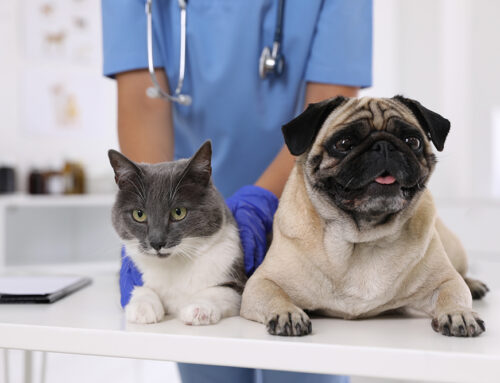The best way to protect your pet from serious health complications is to schedule regular wellness screenings, which not only help keep your pet healthy and happy, but also can prolong your pet’s life. Our Star of Texas Veterinary Hospital team wants to explain how regular wellness screenings safeguard your pet.
#1: Wellness screening weight assessments help protect your pet
Your pet’s weight is a good indication of their health status. Overweight pets are at higher risk for several serious diseases, such as cancer, metabolic dysfunction, kidney disease, and arthritis, while your underweight pet could be suffering from an underlying health condition. Our veterinary team assesses your pet to ensure they are at a healthy weight and evaluates their body condition score (BCS). This scoring system assigns a number to your pet based on their body fat at key body locations. The BCS ranges from one to nine, with a score of one meaning your pet is severely underweight and a score of nine meaning they are severely overweight. If your pet is underweight, our veterinary team may recommend further diagnostics to determine whether an underlying health condition is causing the weight loss. If your pet is overweight, we will devise a strategy to help your pet safely lose the excess pounds. The wellness screening visit is also a good time for you to ask about your pet’s nutrition and exercise regimen.
#2: Wellness screening physical examinations help protect your pet
During a routine wellness screening, our veterinary team evaluates your pet from their wet nose to the tip of their furry tail. Elements assessed include:
- Temperature — We evaluate your pet’s body temperature, which is normally between 101 to 102.5 degrees. Abnormalities can indicate issues such as infection, metabolic dysfunction, and heat stress.
- Eyes — We use an ophthalmoscope to assess your pet’s retina, lens, and cornea. Potential abnormalities include cataracts, dry eye, and retinal degeneration.
- Ears — We use an otoscope to assess your pet’s ear canal and tympanic membrane to help us detect parasites, ear infections, and ear polyps.
- Mouth — We evaluate your pet’s mouth to determine if they have dental disease or other dental abnormalities. Dental disease is present in the majority of pets by 3 years of age, and the condition can cause problems such as bad breath, bleeding gums, tooth root infections, and loose, painful, and missing teeth. In addition, the causative bacteria can enter your pet’s bloodstream and damage organs throughout their body.
- Lymph nodes — We palpate your pet’s lymph nodes to ensure they aren’t enlarged or painful. Abnormalities can indicate issues such as infection or cancer.
- Heart — Our veterinary professionals listen to your pet’s heart with a stethoscope, and can detect issues such as heart murmurs and arrhythmias that can indicate a heart condition.
- Lungs — We listen to your pet’s lungs to ensure they are breathing normally. Abnormalities can indicate conditions such as infection or asthma.
- Abdomen — We gently palpate your pet’s abdomen to assess their organs and ensure no tumors are present.
- Limbs — We evaluate your pet’s gait and palpate their joints and limbs to ensure they have no pain that could indicate joint disease or other orthopedic conditions.
#3: Wellness screening blood work helps protect your pet
Pets are excellent at hiding illness, and not all conditions can be detected during a routine physical examination. Our veterinary team performs blood work to assess your pet’s overall health and to help us diagnose conditions in the early stages when they are more easily managed. Blood work performed during a typical wellness screening includes:
- Complete blood count (CBC) — We use a CBC to evaluate your pet’s white blood cells, red blood cells, and platelets. Abnormalities can indicate conditions such as infection, anemia, stress, certain cancers, and clotting disorders.
- Biochemistry profile — We use a biochemistry profile to assess several aspects of your pet’s health. Abnormalities can indicate conditions such as kidney disease, liver disease, diabetes, and electrolyte disturbances.
#4: Wellness screening urinalysis helps protect your pet
We assess your pet’s urine to detect conditions such as urinary tract infections, urinary crystals, kidney disease, and diabetes. Elements assessed include:
- Appearance — Your pet’s urine should be pale yellow, and clear to slightly cloudy. Dark urine indicates dehydration, while clear urine can indicate your pet is drinking and urinating more frequently than normal. Increased urine cloudiness can indicate the presence of blood, inflammatory cells, crystals, or mucous.
- Concentration — We evaluate urine concentration to assess your pet’s hydration status and determine if their kidneys are functioning properly.
- Acidity — Your pet’s urine should be mildly acidic to mildly alkaline. Abnormalities can indicate conditions such as infection or metabolic disease.
- Chemical analysis — We test your pet’s urine for substances such as protein, glucose, blood, and ketones that could indicate health problems.
- Microscopic analysis — We evaluate your pet’s urine under a microscope to detect red blood cells, white blood cells, bacteria, crystals, and tissue cells.
#5: Wellness screening fecal checks help protect your pet

Intestinal parasites in pets are a common problem, and can cause issues such as anemia, vomiting, diarrhea, and weight loss. We assess your pet’s feces to ensure no parasites, such as hookworms, roundworms, whipworms, giardia, and coccidia, are present.
Your pet can’t live forever, but regular wellness screenings are the best way to ensure they live a long, healthy, and happy life. If you would like to schedule a wellness screening for your pet, contact our Star of Texas Veterinary Hospital team, so we can ensure no health issues are compromising their quality of life.






